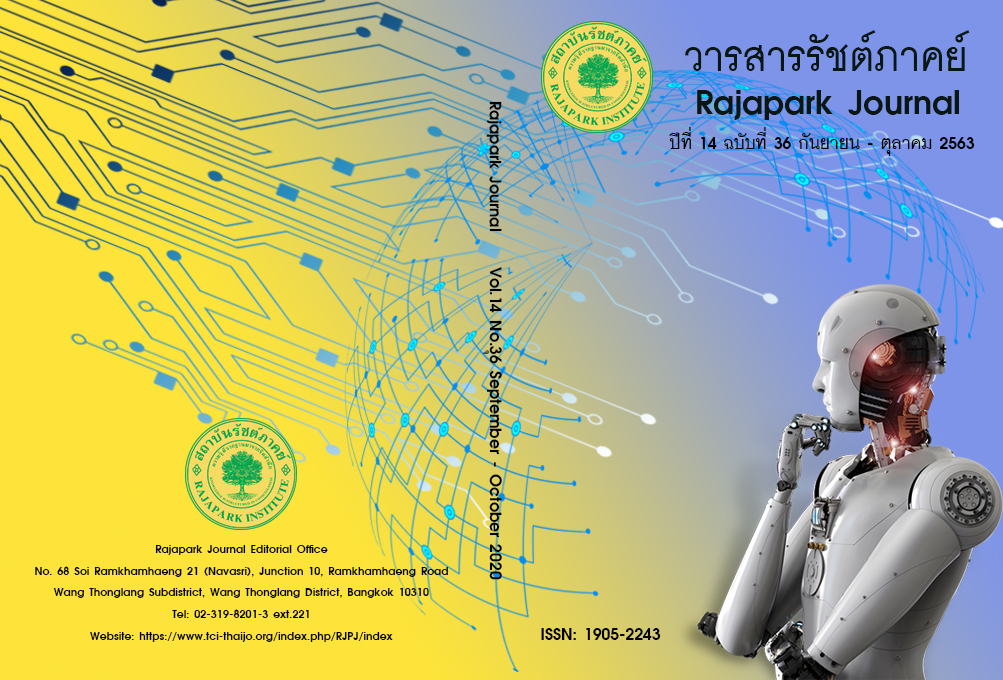Development of Virtual English Training Program to Enhance English Listening and Speaking Skills of Hotel Personnel
Main Article Content
Abstract
The purposes of the study were 1) to develop a virtual training program to enhance the English listening and speaking skills of hotel personnel, 2) to evaluate the effectiveness of the virtual training program for hotel personnel, and 3) to determine the perception of hotel personnel towards using the virtual training program. A pre-test post-test was employed to determine the effectiveness of the virtual training program and to evaluate the English listening and speaking skills of the hotel personnel. An English Placement Test was administered before the quasi-experiment. Participants were asked to complete a questionnaire to determine their perception of using the virtual training program. The population was fifty-two hotel personnel from two hotels in Chonburi province, Thailand. The sample was thirty-six hotel personnel selected using a purposive sampling method. A virtual English training program was developed and administered via the Learning Management System (LMS) by using the Moodle platform. Descriptive statistics and paired sample t-test with a significant level at 0.05 were employed for data analysis. The research results showed as follows: 1. After using the virtual training program, the English listening skills of hotel personnel improved significantly. 2. After using the virtual training program, the English speaking skills for hotel personnel improved significantly. 3. The perception of using the virtual English training program was at a very high satisfaction level.
Article Details
Views and opinions appearing in the Journal it is the responsibility of the author of the article, and does not constitute the view and responsibility of the editorial team.
References
Alodwan, T., & Almosa, M. (2018). The effect of a computer program based on Analysis, Design, Development, Implementation and Evaluation (ADDIE) in improving Ninth Grades’ listening and reading comprehension skills in English in Jordan. English Language Teaching, 11(4), 43-51.
Aryadoust, V., & Shahsavar, Z. (2016). Validity of Persian Blog Attitude Questionaire: An Evidence-Base Approach. Journal of Modern Applied Statistical Methods, 15(1), 417-451.
Common European Framework of Reference for Languages (CEFR) (2001). The CEFR Levels, Retrieved October 7, 2018, from https://www.coe.int/en/web/common-european-framework-reference-languages/level-descriptions.
Haven, C., & Botterill, D. (2003). Virtual Learning Environments in Hospitality, Leisure, Tourism and Sport: A Review. Journal of Hospitality, Laisure, Sport and Tourism Education, 2(1), 75-92.
Hayati, D., & Hashemy, S. A. (2013). Communication Technologies and Virtual Learning environment (VLE) in Teaching Literature. International Journal of Innovation, Management and Technology, 4(2), 181-184.
Hiranrat, W., Ruksasul, N., & Chaijaroen, S. (2016). The design of the centents of an e-learning for Teaching M.5 English language using ADDIE Model. International Journal of Information and Education Technology, 6(2), 127-131.
Ho, W., Higson, H. E., Dey, P. K., Xu, X., & Bashsoon, R. (2009). Measuring performance of virtual learning environment system in higher education. Quality Assurance in Education, Emerald Group Publishing Limited, 17(1), 6-29.
Lim, G. S., Mathis, R. L., & Jackson, J. H. (2010). Human Resource Management An Asia Edition. Singapore: Cengage Learning Asia Pte Ltd.
Lin, L. (2018). Integrating the Problem-Based Learning Approach into a Web-Based English Reading Course. Journal of Educational Computing Research, 56(1), 105-133.
Low, P., & Pongsukvajchakul, P. (2014). Front Desk Skills Development: English Usage, Problems, and Needs. Humanities and Social Sciences Review, 3(4), 223-231.
Ngampornchai, A., & Adams, J. (2016). Students’ acceptance and readiness for E-Learning in Northeastern Thailand. International Journal of Educational Technology in Higher Education, 13(34), 1-13. https://doi.org/10.1186/s41239-016-0034-x
Popovici, S. M. (2013). The eGrammar Clinic: A Moodle-based Tutoring System for English as a Second Language. Doctor of Philosophy, eLearning Methodology. Graduate School of eLearning. Assumption University.
Samruayruen, B., Enriquez, J., Natakuatoong, O., & Samruayruen, K. (2013). Self-regulated Learning: A Key of a Successful Learner in Online Learning Environments in Thailand. Journal of Educational Computing Research, 48(1), 45-69.
Siriphanich, P., & Tasanameelarp, A. (2017). Using Web-application in Training to Enhance Oral proficiency of the Local Tour Guide in Southern Thailand. Journal of Tourism and Hospitality, 6(6), 1-5.
Sirikhan, S., & Prapphal, K. (2011). Assessing Pragmatic Ability of Thai Hotel Management and Tourism Students in the Context of Hotel Front Office Department. The Asian EFL Journal, 53, 72-94.
Sobko, S., Unadka, D., Adams, J., & Hull, G. (2019). Learning through collaboration: A networked approach to online pedagogy. E-Learning and Digital Media, 17(1), 36-55.
Taraporn, T., Torat, S., & Torat, B. (2014). The development of Hotel English Training program focusing on task-based instruction to enhance communication skills. Veridian E-Journal, 7(5), 205-221.
Tourism Authority of Thailand. (2017). Destinations: Chonburi. Retrieved February 20, 2017, from https://www.tourismthailand.org/Destinations/Provinces/chon-buri/464.
Wijewardene, U. P., Azam, S. M. F., & Khatibit, A. (2018). Students’ acceptance of Online Courses and Perceived Risk: A Study of UTAUT in the Sri Lankan State Universities. International Journal of Advances in Scientific Research and Engineering (ijasre), 4(1), 15-22.
World Travel and Tourism Council. (2017). About WTTC. Retrieved March 21, 2017, from https://www.wttc.org/about/.


